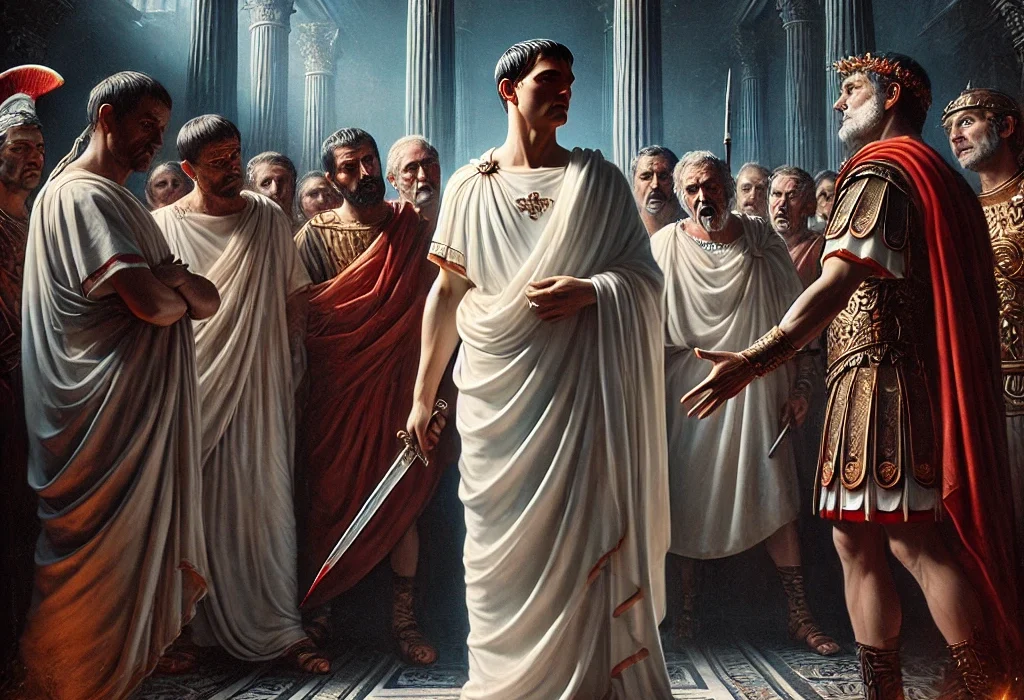“Julius Caesar,” penned by William Shakespeare, is a historical tragedy that delves into themes of power, betrayal, and fate. Set in ancient Rome, it dramatizes the political machinations and moral dilemmas leading up to and following the assassination of Julius Caesar. The play, first performed in 1599, remains a profound exploration of political ethics and personal ambition.
Comprehensive Plot Summary
In the bustling streets of Rome, the city is abuzz with the triumphant return of Julius Caesar. Celebrations fill the air as the people rejoice in his victorious conquests. Yet, beneath this veneer of public adulation, not all are pleased. Flavius and Marullus, two tribunes, scold the commoners for their fickleness, reminding them how they once cheered for Pompey, Caesar’s former rival. This dissatisfaction simmers just below the surface, waiting to erupt.
During the festivities, a soothsayer steps forward and ominously warns Caesar to “beware the Ides of March.” Caesar dismisses this, brushing off the warning as the ramblings of a madman. Meanwhile, Cassius, a senator, grows increasingly wary of Caesar’s ascent to power. Seeing an opportunity, he begins to weave a web of manipulation around Brutus, a man known for his integrity and honor, suggesting that Caesar’s rise could spell the end of the Roman Republic.
Brutus is a man torn between his loyalty to Caesar and his duty to Rome. Cassius, sensing this inner turmoil, plants forged letters from supposed Roman citizens, urging Brutus to act against Caesar. These letters play on Brutus’s fears and sense of responsibility, convincing him that assassinating Caesar is a necessary evil to save the Republic from tyranny.
As the conspirators, including Casca, Decius Brutus, and Trebonius, gather to finalize their plans, the night is filled with unnatural omens. A storm rages, lions roam the streets, and ghostly apparitions are seen. Despite these warnings and the pleas of his wife Calpurnia, who has dreamt of Caesar’s death, Caesar decides to go to the Capitol. Decius Brutus reinterprets Calpurnia’s dream to flatter Caesar, suggesting it signifies his strength and the adoration of Rome.
On the Ides of March, the conspirators encircle Caesar under the pretense of presenting a petition. Suddenly, they attack. Caesar, in his final moments, sees Brutus among his attackers and, with a heartbroken “Et tu, Brute?”, succumbs to his wounds. The murder of Caesar sends Rome into chaos. The conspirators attempt to calm the public, with Brutus addressing the crowd to explain their actions as a necessary measure to prevent Caesar’s tyranny.
Initially, the crowd is swayed by Brutus’s rational and honorable speech. But Mark Antony, Caesar’s loyal friend, seeks to turn the tide. Granted permission by Brutus to speak at Caesar’s funeral, Antony delivers a masterful oration. He subtly condemns the conspirators while praising Caesar’s virtues, reading Caesar’s will, which leaves his wealth to the people of Rome. Antony’s rhetoric ignites the crowd’s emotions, turning them against the conspirators and sparking a riot.
With the city in upheaval, Brutus and Cassius are forced to flee. Antony, Octavius Caesar (Caesar’s adopted son), and Lepidus form the Second Triumvirate, swearing to avenge Caesar’s death and restore order. They march against Brutus and Cassius, leading to a civil war that culminates in the Battle of Philippi.
Before the battle, Brutus is visited by Caesar’s ghost, who ominously tells him they will meet again at Philippi. This apparition shakes Brutus, foreshadowing his doom. During the battle, miscommunications and poor decisions plague Brutus and Cassius’s forces. Believing their side to be losing, Cassius orders his servant Pindarus to kill him. Shortly after, realizing the battle is lost, Brutus decides to end his own life. He asks his servant Strato to hold his sword while he runs onto it, choosing death over capture.
In his final moments, Brutus reflects on his actions, believing he acted with honor and for the good of Rome, even if the outcome was tragic. As Brutus dies, Antony and Octavius arrive. Antony, moved by Brutus’s noble spirit, declares that Brutus was “the noblest Roman of them all,” acknowledging that unlike the other conspirators, Brutus acted not out of envy but out of a genuine belief in the Republic’s welfare.
With Brutus and Cassius dead, the remaining conspirators are captured or killed, and Antony and Octavius emerge victorious. The play closes on a somber note, with Antony and Octavius preparing to restore order to Rome, but the shadow of Caesar’s assassination and the civil strife it caused lingers over the Republic, a testament to the complex interplay of honor, power, and betrayal that shaped these historical events.
Main Characters
- Julius Caesar: A celebrated Roman general whose ambition and potential for tyranny alarm his friends and foes alike.
- Brutus: A senator and close friend to Caesar, driven by his sense of honor and the belief that Caesar’s death is necessary for Rome’s freedom.
- Cassius: A shrewd and manipulative senator who masterminds the conspiracy against Caesar.
- Mark Antony: A loyal friend of Caesar who skillfully turns public opinion against the conspirators.
- Calpurnia: Caesar’s wife, who has prophetic dreams warning him of his impending death.
- Portia: Brutus’s wife, who senses her husband’s inner turmoil and pleads for his confidence.
Themes and Motifs
- Power and Ambition: The play scrutinizes the effects of personal ambition on political ethics and the stability of the state.
- Fate vs. Free Will: Characters grapple with their ability to influence events versus being at the mercy of destiny, exemplified by Caesar’s disregard of omens.
- Public vs. Private Self: The conflict between one’s public duties and private emotions is central, particularly in Brutus’s internal struggle.
- Betrayal and Loyalty: The assassination is a profound act of betrayal, highlighting complex loyalties among friends, family, and the state.
Writing Style and Tone
Shakespeare’s “Julius Caesar” is characterized by its eloquent and powerful language, rich with rhetorical devices and classical references. The dialogue is often poetic, employing iambic pentameter that enhances the dramatic intensity. The play’s tone oscillates between the grandeur of public discourse and the intimate reflections of personal conscience, creating a layered narrative that explores both the political and emotional landscapes of its characters. Shakespeare’s deft use of dramatic irony and persuasive monologues allows for a nuanced examination of moral and ethical dilemmas, making “Julius Caesar” a timeless exploration of human nature and political power.
If this summary has sparked your interest, we would appreciate you subscribing to our newsletter.
There’s a treasure trove of other fascinating book summaries waiting for you. Check out our collection of stories that inspire, thrill, and provoke thought, just like this one by clicking here.
If you want to request a book summary, click here.
When Saurabh is not working/watching movies/reading books/traveling, you can reach him via Twitter/X, or LinkedIn.
Restart reading!






